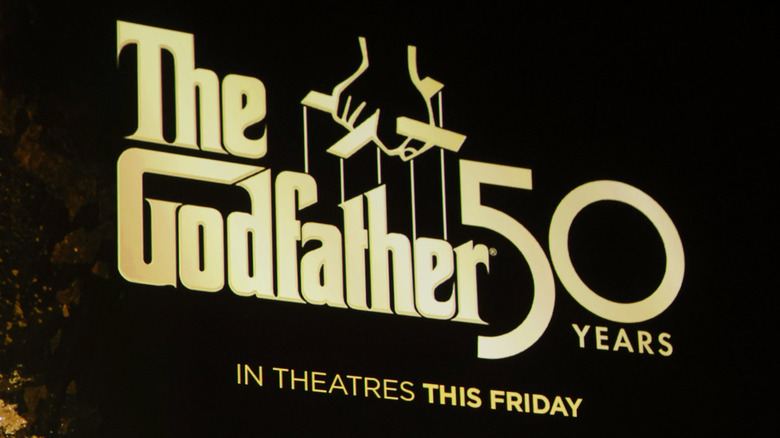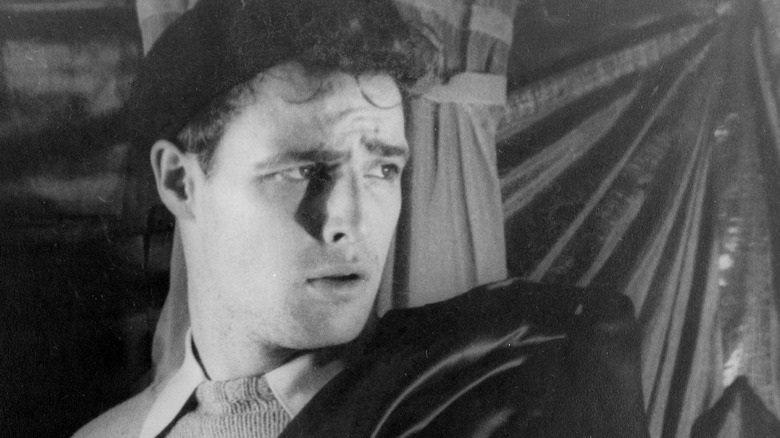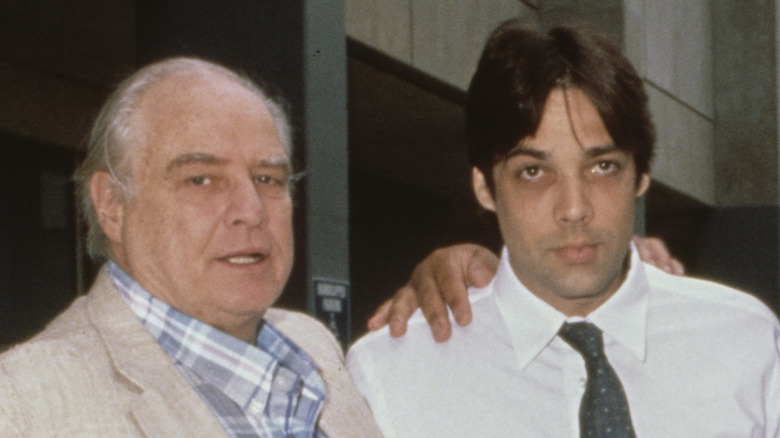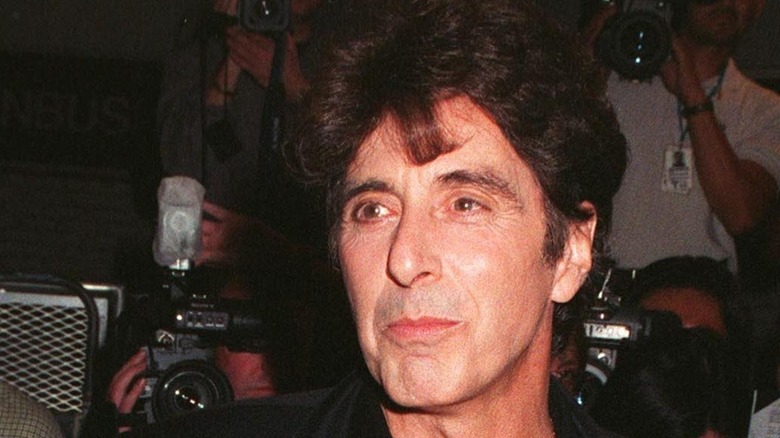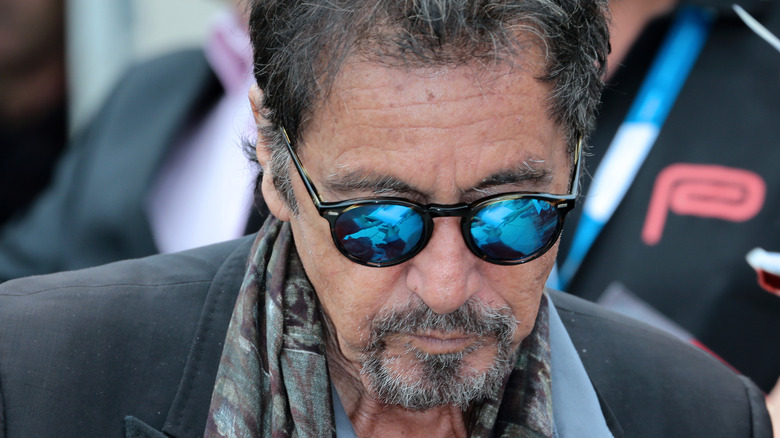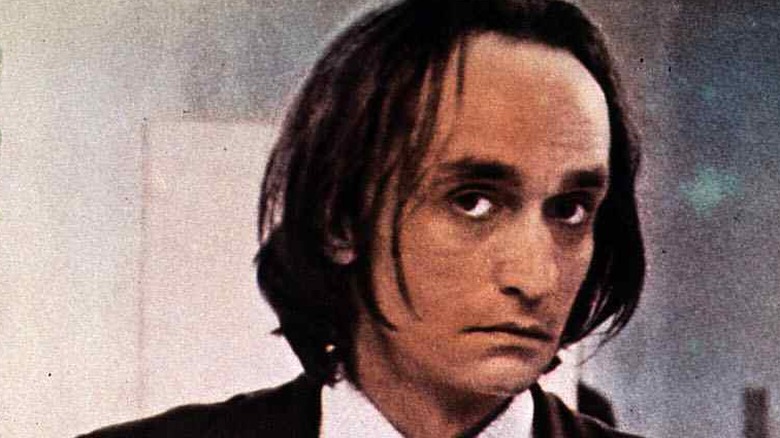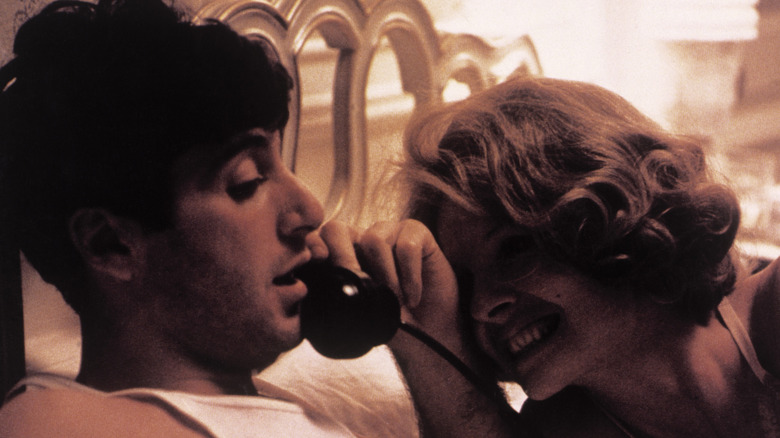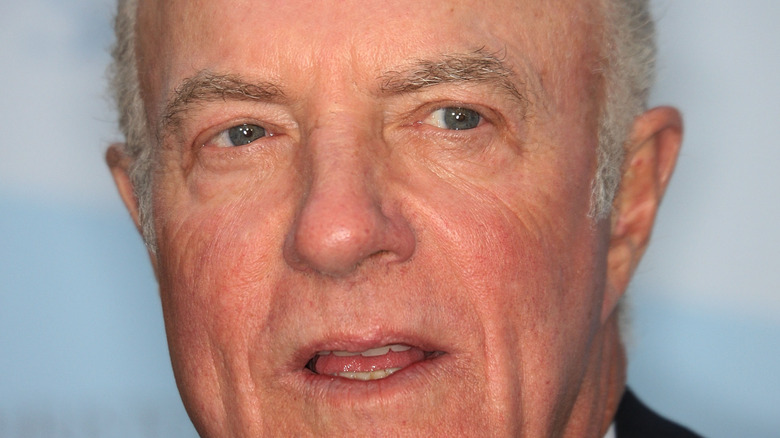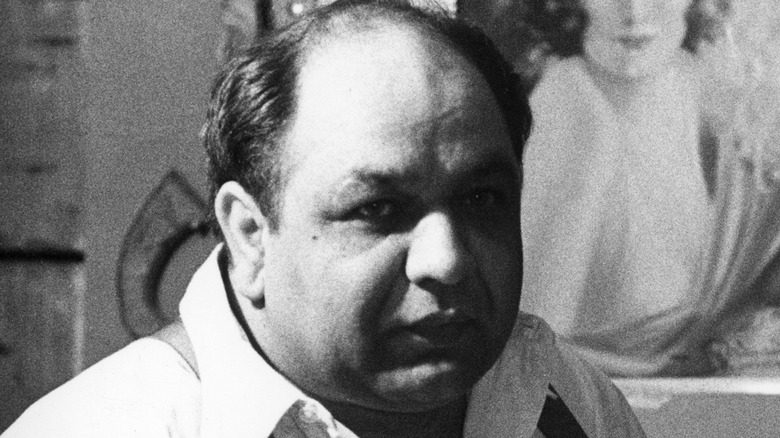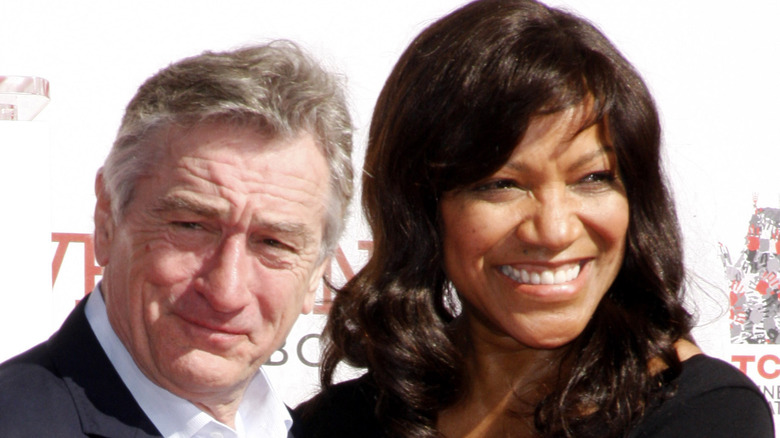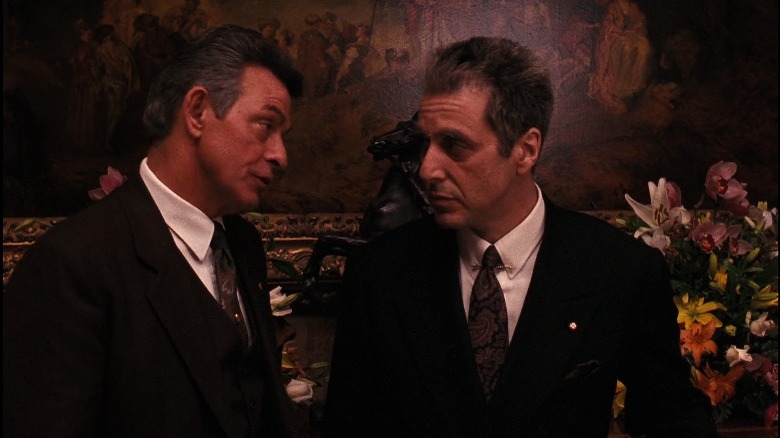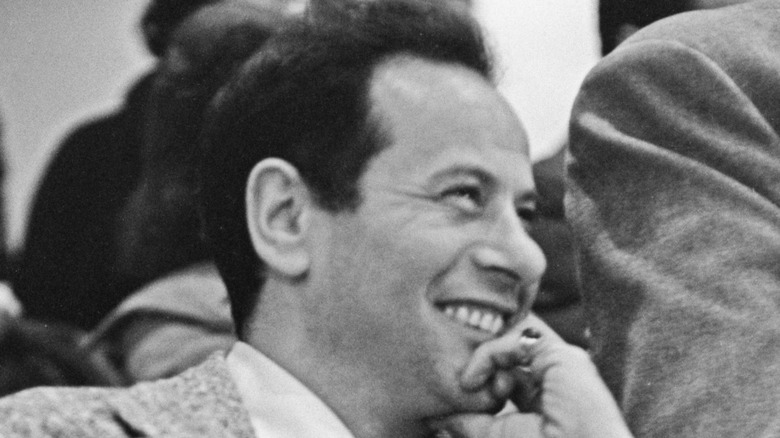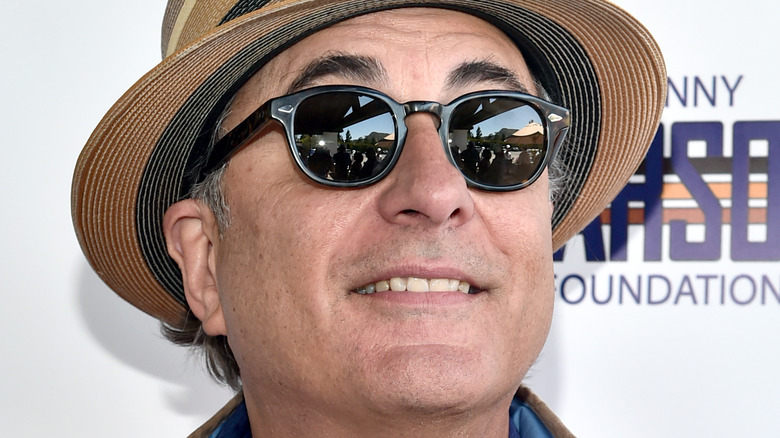Tragic Details About The Godfather Cast
"The Godfather" celebrated its 50th anniversary in 2022. The milestone brought with it a limited theatrical re-release for the film that won the top location average at the box office for one weekend (per the Hollywood Reporter). There were glowing retrospectives in TIME, the Guardian, IndieWire, and Urban Matter, to list just a few. Director Francis Ford Coppola and stars Al Pacino and Robert De Niro reunited at the 94th Academy Awards to take in the applause and say a few words about the anniversary (per Entertainment Weekly). "The Godfather, Part II" is still considered one of the best sequels ever made, and even "The Godfather, Part III" has won new praise in the wake of its 2020 "Coda" re-edit (per Variety). Time has proven very good to the Corleone family saga.
It hasn't always been so good to the real-life participants in the films, however. "The Godfather" is one of the most beloved and successful trilogies in cinema history. If cast members didn't enjoy fame and fortune before featuring in the series, they did afterwards. But even that amount of success can't act as a shield against life and would do the cast no good for heartbreaks and setbacks incurred prior to "The Godfather." Participants in every entry have had tragedies to endure, before and after their stints in Coppola's iconic trilogy.
Marlon Brando's brutal childhood
By the time he was cast in "The Godfather," Marlon Brando already held the reputation of a brilliant, if troublesome, actor. It was a status many leagues away from his working-class background in Omaha, Nebraska, a past Brando was happy to shroud in tall tales according to Stevan Riley. Riley was the director of "Listen to Me Marlon," a 2015 documentary on Brando largely built from the actor's own words. Writing for the Telegraph, Riley cut through the evasions and divulged some of the truth about Brando's upbringing.
If Brando wanted to keep his childhood private, he had good reason. In personal recordings used for "Listen to Me Marlon," Brando recalled a father, Marlon Sr., who was often away from home on benders of booze and extramarital affairs, and abusive to his wife and children when he was home (via the Chicago Reader). To cope, his wife Dorothy "Dodie" Pennebaker drank to the neglect of her children. Brando frequently had to collect her from bars and sometimes had to revive her.
The parents' misbehavior tarnished the reputation of the Brando family wherever they moved. Brando took to acting out, attracting more scorn from his father. But Marlon Sr.'s abuse of Dodie became so severe that Brando threatened to kill his father if he ever did it again. And when Brando became a father himself, he told himself he would never let Marlon Sr. near his children (per GQ).
If you or someone you know is dealing with domestic abuse, you can call the National Domestic Violence Hotline at 1−800−799−7233. You can also find more information, resources, and support at their website.
If you or someone you know may be the victim of child abuse, please contact the Childhelp National Child Abuse Hotline at 1-800-4-A-Child (1-800-422-4453) or contact their live chat services.
The horrifying death of Marlon Brando's daughter
"I think that perhaps I failed as a father," Marlon Brando said at the age of 66 (per the Chicago Reader). "Certainly there were things I could have done differently if I had known better at the time." Many parents look back with a few regrets, however minor. But Brando didn't say these words in a private recollection or a conversation with a close friend or counselor. They were said at the 1990 trial of his son, Christian, for the muder of Dag Drollet, the boyfriend of Christian's half-sister Cheyenne. And the death happened in Brando's own home.
According to a contemporary Entertainment Weekly report, Cheyenne had always struggled with her mental health, even more so after a car accident in 1989. When she, Drollett, and Christian all came together in Brando's Hollywood home on May 16, she was allegedly taking psychedelics despite being eight months pregnant. Christian had his own struggles with drugs, alcohol, and gun violence. Both had issues with their father.
At dinner with her half-brother, Cheyenne claimed Drollet beat her (per GQ). That night, Christian indisputably put a bullet in Drollet's head, though little else about the violent incident is known for certain. In the trial, the defense eventually accepted a plea of voluntary manslaughter after Cheyenne was deemed too unstable to testify for the prosecution's charge of murder. While her half-brother served his sentence, Cheyenne — who may have lied about Drollet's abuse — hanged herself in 1995.
If you or anyone you know is having suicidal thoughts, please call the National Suicide Prevention Lifeline at 1-800-273-TALK (8255).
Al Pacino lost his family at a young age
Unlike Michael Corleone, Al Pacino did not grow up with a loving but powerful father. He grew up without any father at all. Writing for the "This Much I Know" series in the Guardian, Pacino recalled that his parents divorced when he was only 2 years old, and after the split, his father was an absentee figure. "The conclusion of my teachers was that I needed a dad," wrote Pacino. But he didn't lack for family. He grew up impoverished but cared for by his mother Rose, his aunt, and his maternal grandparents according to Interview Magazine. It was Grandma who ruled the roost, but Pacino was closest to his mother and grandfather.
If Pacino's family weren't enthusiastic about his becoming an actor, they accepted his choice. He called Rose his first "and indeed my best audience" in an interview with the New Yorker, and credited her with introducing him to the theater. Rose had Pacino at a young age, and struggled between a playful side and serious depression as he grew up. She became addicted to barbiturates and died in 1962 at just 43 years old, possibly of suicide. Pacino was 21 at the time. His grandfather died not long after. "I think that was my darkest period," Pacino said, looking back. "I felt lost."
Al Pacino, alcoholic
When asked what his favorite part of acting was, Sir Laurence Olivier once said "the drink after the show," according to the Independent. Booze was a fashionable recreation among theater performers when Al Pacino came on the scene. And he had a head start, having picked up the bottle at 13 years old. By the time he reached 31, it started to affect his work. He turned up to his audition for "The Godfather" hungover and tried improvising, to cover up not knowing the scene. If Francis Ford Coppola hadn't had his heart set on Pacino for the role of Michael Corleone, he wouldn't have been in the film.
As Pacino's fame rose in the wake of "The Godfather," so did the amount of alcohol he put back. He worked drunk on "Dog Day Afternoon," after almost turning it down during a London bender. He later credited inebriation with facilitating a key decision for his character, but Pacino had reached a point where he valued his drinks more than his career. He has said that an early acting teacher, Charlie Laughton, made him realize he had a problem in 1977. As of 2022, Pacino has been sober for over 40 years.
If you or anyone you know is struggling with addiction issues, help is available. Visit the Substance Abuse and Mental Health Services Administration website or contact SAMHSA's National Helpline at 1-800-662-HELP (4357).
The short life of John Cazale
All the Corleone sons met with unhappy fates in "The Godfather" trilogy, but Fredo led the most outwardly unhappy life. He was sweet and dutiful as a son, but also inept and dim-witted. His marriage was loveless, he failed to stop the assassination attempt on his father, and after Sonny's death, Fredo was passed over in favor of Michael.
John Cazale never reached the same level of fame as James Caan and Al Pacino, but he never expressed any resentment over it. He never inadvertently abetted a hit on Pacino, either. And, quite unlike Fredo, Cazale was brilliant in his profession and universally respected by his peers. "I think I learned more about acting from John than anybody," said Pacino, and Cazale's lover Meryl Streep called him "monomaniacal" in his dedication (per Boston.com). If not a household name, he was an accomplished character actor on screen and stage; it was his work in "Horovitz's Line" off-Broadway, with friend and one-time housemate Pacino, that caught Francis Ford Coppola's eye (per Entertainment Weekly).
But for all his talent, Cazale only appeared in five movies. It was all he had time for. According to the New York Post, Cazale was diagnosed with terminal lung cancer in 1977. Cazale maintained that he could recover and kept working on "The Deer Hunter," but the cancer spread to his bones. Streep ceased work for five months to care for Cazale until he passed away at 42.
Diane Keaton and Al Pacino couldn't make it work
Things never worked out for Michael and Kay Corleone, for good reason. Their innocent courtship is cut short by Michael's murder of Solozzo, and their later marriage is wounded by Michael's criminality at the end of "The Godfather." Their relationship is destroyed by Michael's coldness and paranoia in "The Godfather, Part II." And when they start to reconcile in "The Godfather, Part III," their daughter is killed.
There was no death or crime to come between Al Pacino and Diane Keaton, but they mirrored their characters with their own on-again, off-again romance. Keaton told People that she was first attracted to Pacino on the set of "The Godfather." "There was an aspect of him that was like an orphan, like this kind of crazy idiot savant," she said. "And oh, gorgeous!" The two got together soon after filming "The Godfather, Part II" (per In Style).
By the time cameras rolled on "The Godfather, Part III," Keaton was ready for something more solid. "I gave Al an ultimatum: Marry me, or at least commit to the possibility," she wrote in her book, "Then Again." Pacino didn't want to commit, and after a year of hesitating, they called it quits for good. Looking back in another People interview (via Her), Keaton lamented that, while it wasn't a devastating loss, chasing lovers like Pacino cost her a chance at a solid marriage.
James Caan's battle with drugs
For years after "The Godfather," James Caan dealt with members of the public who assumed he was as hot-tempered and violent as Sonny Corleone, according to Vanity Fair. He was even barred from a country club when the board assumed he was a genuine mobster. Caan did have a tough streak in him growing up, as he shared with Cigar Aficionado, and there were rumors of violence around him, but he was never a real gangster. He did have a connection to the Mafia, though, courtesy of Andrew Russo. But instead of pulling him into crime, Russo helped lead Caan out of a very dark period in his life.
Caan was already living fast after his success in the 1970s, but the death of his younger sister Barbara in 1981 sent him spiraling downward. "Barbara was like my best friend," Caan told the Independent, "When she died, passion became this whole thing with me ... I started doing cocaine, which is like a death sentence." As Caan used drugs to cope with his loss, he also lost his home and most of his fortune. His passion for acting left him; he spent six years away from the cameras.
Coaching boys baseball gave Caan something to do and gave him his first wake-up call about cocaine; his teenage son chased off a drug dealer with a baseball bat. Caan turned to Russo, who researched rehab centers to get him clean.
If you or anyone you know is struggling with addiction issues, help is available. Visit the Substance Abuse and Mental Health Services Administration website or contact SAMHSA's National Helpline at 1-800-662-HELP (4357).
Richard Castellano's career fell apart
One of the most colorful supporting roles in "The Godfather" is Clemenza, played by Richard Castellano. A younger version of the character appeared in the Vito storyline of "The Godfather, Part II," played by Bruno Kirby. As originally conceived, Clemenza played a substantial role in the Michael storyline too. He was meant to be the loyal captain manipulated into betraying Michael and testifying before the U.S. Senate. Yet in the final film, that role is filled by Frank Pentangeli (Michael V. Gazzo), with the only mention of Clemenza in Michael's story being that he died. What happened?
Castellano's answer and Francis Ford Coppola's are irreconcilable. Coppola has long maintained that Castellano wanted approval of his character's dialogue, an untenable demand. But Castellano told the New York Post that he was willing to play both the old and young Clemenza before hitting an artistic block — he just couldn't believe that Clemenza would turn rat. When he decided to pass, Castellano claims he had a promise from Coppola that he would chalk it up to creative differences. Instead, Coppola went with his story.
"Once the lie gets out," Castellano complained, "the lie is told, and it takes." Whatever the truth about Clemenza's role in "Part II," Castellano's career dried up afterwards. He was taking work answering phones by 1981 and made only one more movie before dying at age 55 of a heart attack.
Robert De Niro's contentious divorce
Robert De Niro is a notoriously private man. Journalist Patricia Bosworth of Vanity Fair wrote of how impossible it was to make contact with the actor in 1987, who hates interviews and their frequent focus on his personal life rather than his work. When De Niro filed for divorce from his wife of 21 years, Grace Hightower, he appealed for privacy in a statement published by People (via RTE).
One imagines he wasn't happy when details of his and Hightower's legal battles made it to the press. He and Hightower disputed how much he was obligated to pay her before their 2004 prenup went into effect. In April 2021, Page Six quoted De Niro's lawyer telling a New York judge that her client was suffering from overwork, a necessity to maintain Hightower's opulent lifestyle. Hightower's lawyer countered that De Niro ran up his own heavy expenses, that he'd unfairly cut back his payments to Hightower, and that he was prepared to force his ex-wife and their children out of their Manhattan apartment.
There were outrageous extravagances claimed by both sides. De Niro was alleged to take helicopters to Sunday brunch in Connecticut, and Hightower was said to spend $1.2 million on a diamond. The judge reprimanded both parties: "[You] will still come out of this richer than almost any human being who walks this Earth." Per the Atlanta Black Star (via Yahoo), the court ultimately ruled on De Niro's behalf.
Richard Bright was killed by a bus
One of the few characters to make it through all three "Godfathers" alive doesn't have a famous line or a distinctive look, and he wasn't played by a world-famous actor. But Richard Bright's Al Neri, Michael's deadly bodyguard and hitman, still casts a long shadow through the trilogy. It's Neri who pulls the trigger to kill Fredo, on Michael's orders. Bright was often cast in violent roles, according to E! Online, including a brief stint on "The Sopranos." Away from the cameras, however, Bright's one notable run-in with the law was a charge of obscenity for his performance in the two-man show "The Beard" (the ACLU got the charges dismissed).
Bright was still active as a character actor in 2006 when he went out for a walk on February 18. According to his Washington Post obituary, a private Academy Bus struck Bright while he was crossing the street. He was declared dead by the time he reached the hospital. The bus driver claimed he was unaware that he'd hit anyone until he was questioned at the end of the line.
Eli Wallach's on-set brushes with death
The worst thing that happened to Eli Wallach on "The Godfather, Part III" was having several scenes posthumously cut from the "Coda" rerelease (per Variety). His appearance in another trilogy was a different story. Wallach was Tuco Ramirez, the "ugly" part of "The Good, the Bad, and the Ugly." It was one of Wallach's most famous parts, and he had a great rapport with co-star Clint Eastwood and director Sergio Leone (per a 2003 interview). But Wallach ran afoul of 1960s Italian cinema's notoriously lax safety standards three times.
The first close call came when performing a stunt. Wallach had his hands tied behind his back, a noose around his neck, and a horse underneath him. According to Wallach's "The Good, The Bad, and Me," a gunshot spooked the horse, and he took Wallach on a nearly mile-long ride, heedless to any of the tied-up actor's pleas to stop. Later on, Wallach had to rest his head in a ditch as a train went by. If he had raised his head even slightly, wrote Wallach, he would have been decapitated by one of the train car door steps.
The third incident came on a blazing hot day. Wallach kept himself relieved with a favorite lemon soda kept in a unique bottle. But when he picked up a similar-looking bottle and took a drink, he found he was drinking acid. Wallach managed to spit it out before any permanent damage was done.
Andy García's family fled Cuba
Michael's storyline in "The Godfather, Part II" depicts the fall of the Batista regime in the Cuban Revolution. The rise of Fidel Castro and the communist government would have brutal consequences for a future "Godfather" cast member. Andy García was just 5 years old in 1961, the son of an English teacher and an attorney-slash-avocado farmer according to Kingdom Magazine. They were a well-off family, and like many such families, in danger of ending up on the bad side of the new government. The Garcías became part of the Cuban diaspora that fled to the United States.
"We left everything," García told Kingdom. "Everything was taken away from us." Despite his young age at the time his family fled, García retains strong memories of his home and a fierce love of Cuban culture, particularly its music. When he made his directorial debut in 2006 with "The Lost City," he told the Chicago Tribune that music was "the protagonist of the movie." The film was a passion project of García's since the 1980s, and besides celebrating Cuban music, a key theme of the story for him was the loss of his home country.
